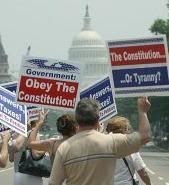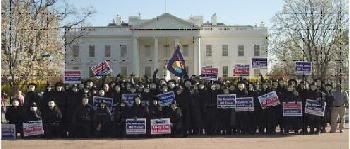Ron Paul on Ed & Elaine Brown: "Heroic true patriots; similar to Ghandi & Martin Luther King."
 Hattip to Casey Lee Cobb and Lee from Roguegovernment.com
Hattip to Casey Lee Cobb and Lee from Roguegovernment.comEditor's comment: This is a watershed event in American political thought. Now the door is wide open for We The People to confront every candidate of any elected position with the same questions about the IRS and the courageous stand the Browns are making to uphold and defend the Constitution of the united States of America.












8 Comments:
I was looking through the archive at givemeliberty looking for all the replies after bob served all congress with the petition for redress. I don't see a reply from Ron Paul. Does anyone know if his office gave a reply.
However let it be known that Ron thinks they should have paid their taxes. There is no excuse for breaking the law.
He can't quite come out and say it, can he?
So I'll say it now, Don't be afraid, Be a patriot and quit paying the unlawful tax on American labor. Your life is not a commodity.
In 1774 our Founders set a precedent for withholding monies from a nonresponsive government.
See: www.givemeliberty.org
http://individualsovereignty.blogspot.com/
I'm going to try and be as neutral about this as possible, because I agree with the Browns in principle, while I disagree on the specifics:
If anyone attempts to deny that an exchange of services for goods (labor for money) is not an earning of "profits" then the person proposing the argument is not educated in economics.
Any exchange where I am willing to trade my labor for a certain dollar amount means that I value those dollars higher than I do my own labor time. In that circumstance I gain: I profit.
The "employer" of my services gains as well because we had a double-coincidence of wants. We both profited in the exchange.
Therefore, niggling over the finer points of language defining "profits" is ridiculous unless you are utilizing a Marxian labor theory.
I suggest instead that people consider the legality of a system whereby the government has the right to collect duties on ANY profits, in an A and B exchange. It never does, although it affords itself the authority.
--M
Michael Hargett said...
Any exchange where I am willing to trade my labor for a certain dollar amount means that I value those dollars higher than I do my own labor time. In that circumstance I gain: I profit.
What is Income? Gain? Don't Be A Fool.
Various Court statements about TAXABLE INCOME:
Stapler v U.S., 21 F Supp 737 AT 739 (1937): "Income within the meaning of the Sixteenth Amendment and the Revenue Act, means 'gain'... and in such connection 'Gain' means profit...proceeding from property, severed from capital, however invested or employed, and coming in, received, or drawn by the taxpayer, for his separate use, benefit and disposal... Income is not a wage or compensation for any type of labor."
Oliver v. Halstead 86 S.E. Rep 2nd 859 (1955): "There is a clear distinction between `profit' and `wages', or a compensation for labor. Compensation for labor (wages) cannot be regarded as profit within the meaning of the law. The word `profit', as ordinarily used, means the gain made upon any business or investment -- a different thing altogether from the mere compensation for labor."
Helvering v Edison Bros. Stores, 133 F2d 575 (1943): "The Treasury cannot by interpretive regulations, make income of that which is not income within the meaning of the revenue acts of Congress, nor can Congress, without apportionment, tax as income that which is not income within the meaning of the 16th Amendment."
Flora v U.S., 362 U.S. 145, (1959) never overruled: "... the government can collect the tax from a district court suitor by exercising it's power of distraint... but we cannot believe that compelling resort to this extraordinary procedure is either wise or in accord with congressional intent. Our system of taxation is based upon VOLUNTARY ASSESSMENT AND PAYMENT , NOT UPON DISTRAINT" [Footnote 43] If the government is forced to use these remedies(distraint) on a large scale, it will affect adversely the taxpayers willingness to perform under our VOLUNTARY assessment system.
Evens v Gore, 253 U.S. 245 (1920): US Supreme court, never overruled "After further consideration, we adhere to that view and accordingly hold that the Sixteenth Amendment does not authorize or support the tax in question. " (A tax on salary)
Edwards v. Keith, 231 F 110,113 (1916): "The phraseology of form 1040 is somewhat obscure .... But it matters little what it does mean; the statute and the statute alone determines what is income to be taxed. It taxes only income "derived" from many different sources; one does not "derive income" by rendering services and charging for them... IRS cannot enlarge the scope of the statute."
McCutchin v Commissioner of IRS, 159 F2d: "The 16th Amendment does not authorize laying of an income tax upon one person for the income derived solely from another."[wages]
Blatt Co. v U.S., 305 U.S. 267, 59 S.Ct. 186 (1938): "Treasury regulations can add nothing to income as defined by Congress."
Olk v. United States, February 18, 1975, Las Vegas, Nevada."Tips are gifts and therefore are not taxable."
Commissioner of IRS v Duberstein, 363 U.S. 278, 80 S. Ct. 1190 (1960):
"The exclusion of property acquired by gift from gross income under the federal income tax laws was made in the first income tax statute 4 passed under the authority of the Sixteenth Amendment, and has been a feature of the income tax statutes ever since. The meaning of the term "gift" as applied to particular transfers has always been a matter of contention. 5 Specific and illuminating legislative history on the point does not appear to exist. Analogies and inferences drawn from other revenue provisions, such as the estate and gift taxes, are dubious. See Lockard v. Commissioner, 166 F.2d 409. The meaning of the statutory term has been shaped largely by the decisional law."
Central Illinois Publishing Service v. U.S., 435 U.S. 21 (1978): "Decided cases have made the distinction between wages and income and have refused to equate the two."
Anderson Oldsmobile, Inc. vs Hofferbert, 102 F Supp 902: "Constitutionally the only thing that can be taxed by Congress is "income." And the tax actually imposed by Congress has been on net income as distinct from gross income. THE TAX IS NOT, NEVER HAS BEEN, AND COULD NOT CONSTITUTIONALLY BE UPON "GROSS RECEIPTS" ..."
Conner v US, 303 F Supp 1187 Federal District Court, Houston, never overruled. "..whatever may constitute income, therefore, must have the essential feature of gain to the recipient. This was true at the time of Eisner V Macomber, it was true under section 22(a) of the Internal Revenue Code of 1938, and it is likewise true under Section 61(a) of the IRS code of 1954. If there is not gain, there is not income, CONGRESS HAS TAXED INCOME, NOT COMPENSATION"!!!
Bowers vs Kerbaugh-Empire Co., 271 US 174 (1926): "Income" has been taken to mean the same thing as used in the Corporation Excise Tax Act of 1909, in the Sixteenth Amendment and in the various revenue acts subsequently passed ...."
Brushaber v. Union Pacific R.R. Co., 240 U.S. 1 (1916): "The conclusion reached in the Pollock Case did not in any degree involve holding that income taxes generically and necessarily came within the class of direct taxes on property, but on the contrary recognized the fact that taxation on income was in its nature an excise entitled to be enforced as such..."
Simms v. Ahrens, 271 SW 720 (1925): "An income tax is neither a property tax nor a tax on occupations of common right, but is an EXCISE tax...The legislature may declare as 'privileged' and tax as such for state revenue, those pursuits not matters of common right, but it has no power to declare as a 'privilege' and tax for revenue purposes, occupations that are of common right."
Eisner v. Macomber, 252 US 189 (1920), US Supreme court, never overruled: "...the definition of 'income' approved by this court is: The gain derived from capital, from labor, or from both combined, provided it be understood to include profits gained through sale or conversion of capital assets."
Laureldale Cemetery Assoc. v. Matthews, 345 Pa. 239 (1946): "Reasonable compensation for labor or services rendered is not profit"
Schuster v. Helvering, 121 F 2nd 643: "Income is realized gain."
Butchers' Union Co. v. Crescent City Co., 111 U.S. 746 (1883). One of the most eloquent opinions ever delivered by the Court..
"Among these unalienable rights, as proclaimed in the Declaration of Independence is the right of men to pursue their happiness, by which is meant, the right any lawful business or vocation, in any manner not inconsistent with the equal rights of others, which may increase their prosperity or develop their faculties, so as to give them their highest enjoyment...It has been well said that, THE PROPERTY WHICH EVERY MAN HAS IS HIS OWN LABOR, AS IT IS THE ORIGINAL FOUNDATION OF ALL OTHER PROPERTY SO IT IS THE MOST SACRED AND INVIOLABLE..."
Pollack v. Farmers Loan, 157 U.S. 429, 158 U.S. 601 (1895): The Corporate Excise Tax of 1909 was a 2% tax on PROFITS OF CORPORATIONS. The Supreme Court had, in POLLOCK v. FARMERS LOAN , in 1894, ruled as UNCONSTITUTIONAL the EXACT SAME KIND OF TAX MOST AMERICANS ARE NOW PAYING! [A direct tax without apportionment.] This decision has NEVER been overturned! Both BEFORE and AFTER the sixteenth amendment passed (?), THE COURTS SAID INCOME WAS CORPORATE PROFIT! The Separation of powers doctrine says only CONGRESS can collect a tax!
kosmic -
The courts and legislatures are not paladins of free market economic thought. Quite the opposite. Every definition of "wage" you cited in those cases derives from a socialist meaning, not a free market one.
What you have there are Marxist wage theories utilized in allegedly free market economics.
"Income" is profit in true economic terms. It is receiving goods (money) for services rendered.
You stated before that "your life is not a commodity." Actually, it is. My time (the objective unit of measure for life) is a commodity upon which I place value.
If I value my time as less valuable than $20 per hour, when an employer offers me $20 per hour for my time I will gladly accept. By this same token the employer values my hour more highly than he does his $20.
This is basic economics.
Utilizing your theories and the examples you cite, wages are not viewed as "profits." What are they, then? Losses? Breaking even?
Nobody would go to work each day for losses. It would be better to not go to work in that case. It cannot be "breaking even" because again, there would be no point. It must be profits that motivate, otherwise there would be no purpose served in acting.
Regardless of what the legislatures and courts might say, I have drawn my conclusions from higher principles: those of the solid laws of economics.
What(how much money)does it take to support your life? Does the state or federal government pay for your food, shelter, clothing, transportation, utilities, and the maintenance thereof? My Grandmother put it simply, "if you don't work, you don't eat". If working for money which we all exchange for the things we need to support our lives and our happiness can be considered gain, then I guess it's time to tear up the constitution. A tax on your labor boils down to a tax on breathing or just being alive. Labor is not a comodity, it is LIFE, my life and your LIFE and we have the UN A LIENABLE RIGHT to LIFE, LIBERTY and the PURSUIT of HAPPINESS!!!!!
Post a Comment
Subscribe to Post Comments [Atom]
<< Home